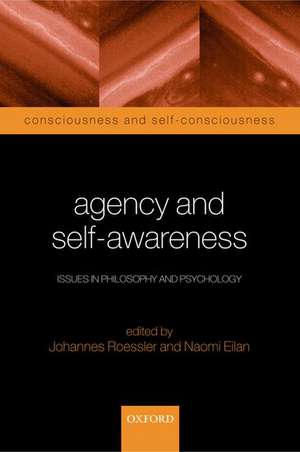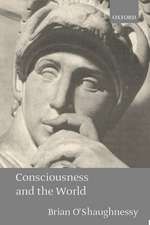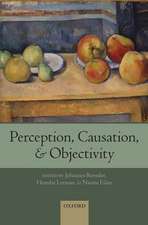Agency and Self-Awareness: Issues in Philosophy and Psychology: Consciousness & Self-Consciousness Series
Editat de Johannes Roessler, Naomi Eilanen Limba Engleză Hardback – 31 iul 2003
| Toate formatele și edițiile | Preț | Express |
|---|---|---|
| Paperback (1) | 361.01 lei 31-37 zile | |
| OUP OXFORD – 31 iul 2003 | 361.01 lei 31-37 zile | |
| Hardback (1) | 347.07 lei 31-37 zile | |
| OUP OXFORD – 31 iul 2003 | 347.07 lei 31-37 zile |
Preț: 347.07 lei
Preț vechi: 442.64 lei
-22% Nou
Puncte Express: 521
Preț estimativ în valută:
66.42€ • 69.09$ • 54.83£
66.42€ • 69.09$ • 54.83£
Carte tipărită la comandă
Livrare economică 04-10 aprilie
Preluare comenzi: 021 569.72.76
Specificații
ISBN-13: 9780199245611
ISBN-10: 0199245614
Pagini: 428
Ilustrații: 1
Dimensiuni: 162 x 242 x 26 mm
Greutate: 0.75 kg
Editura: OUP OXFORD
Colecția OUP Oxford
Seria Consciousness & Self-Consciousness Series
Locul publicării:Oxford, United Kingdom
ISBN-10: 0199245614
Pagini: 428
Ilustrații: 1
Dimensiuni: 162 x 242 x 26 mm
Greutate: 0.75 kg
Editura: OUP OXFORD
Colecția OUP Oxford
Seria Consciousness & Self-Consciousness Series
Locul publicării:Oxford, United Kingdom
Recenzii
'This fine collection comprises seventeen articles by philosophers and psychologists, and a comprehensive introduction by the co-editors. The 47-page introduction, entitled Agency and Self-Awareness: Mechanisms and Epistemology, provides a superb entrée to both the topic of the collection and the experimental work the various authors draw upon; it is worth the price of admission on its own. . . . The collection is certainly required reading for anyone interested in action theory or the role of agency in self-conception. It will also be useful for those who work on self-knowledge and the philosophy of psychology.'
This collection of seventeen essays, plus an excellent editor's introduction, is noteworthy in the interdisciplinary stance taken. Containing cutting-edge contributions from both philosophers and psychologists, it will be valuable to students and practitioners of both disciplines. This cross-fertilisation of ideas is both instructive and a pleasure to see. Philosophers have much to learn from their colleagues in psychology departments, and vice versa ... Whichever side of the divide one is on, one cannot fail to learn from the way in which this interaction has been carried out ... this fascinating volume of essays ... will repay serious attention ... provides an excellent addition to a growing interdisciplinary field. Those interested in either the philosophical or psychological aspects of action will find it a great source of stimulating material.
This collection of seventeen essays, plus an excellent editor's introduction, is noteworthy in the interdisciplinary stance taken. Containing cutting-edge contributions from both philosophers and psychologists, it will be valuable to students and practitioners of both disciplines. This cross-fertilisation of ideas is both instructive and a pleasure to see. Philosophers have much to learn from their colleagues in psychology departments, and vice versa ... Whichever side of the divide one is on, one cannot fail to learn from the way in which this interaction has been carried out ... this fascinating volume of essays ... will repay serious attention ... provides an excellent addition to a growing interdisciplinary field. Those interested in either the philosophical or psychological aspects of action will find it a great source of stimulating material.
















